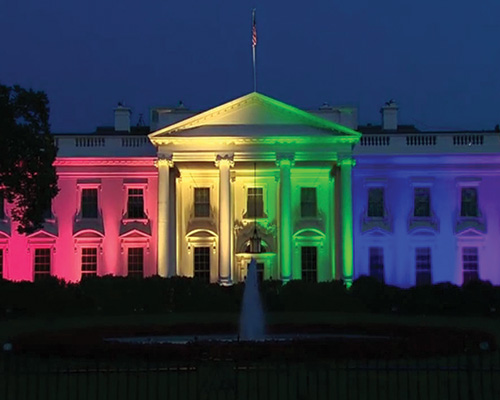Editor’s note: This was written prior to the release of the Supreme Court’s ruling legalizing same-sex marriage.
My teenage cousin is graduating from high school next month in rural (conservative) Ohio. She is popular, active in her local 4-H club, and this year, her prom date was her boyfriend. But last year’s prom date was a girlfriend. No one batted an eye. I recently met a high school junior who attends my alma matter, a Madison public high school. Out of curiosity, I asked her whether, at her school, any boys date boys or girls date girls. She looked at me like I’d just walked off of a spaceship and said, “Of course they do.” When I attended the same high school 17 years ago, openly dating a member of the same sex would have been unheard of.
Since April 28, 2015, when the US Supreme Court heard oral arguments in their most recent case to address same-sex marriage, Obergefell v. Hodges, there has been widespread speculation as to how the court will decide. Most guesswork revolves around Justice Kennedy—Kennedy wrote the opinions for the Court’s most recent, most significant LGBTQ rights cases (i.e., Lawrence v. Texas, Romer v. Evans, U.S. v. Windsor), and is largely considered to be the Court’s “swing voter” on gay rights issues. During the Obergefell oral arguments, Kennedy’s rumination on the definition of marriage as between a man and a woman, with that definition largely unchanged for “millennia,” was a major cause for concern to some. Commentators have also noted that Kennedy has affection for a state’s rights argument, and laws regarding marriage have traditionally been within the purview of the states. Case in point: his opinion in Windsor struck down the section of the Defense of Marriage Act (DOMA) that allowed the federal government to deny marriage-related rights to same-sex couples while leaving intact the section of DOMA that allows states to continue this discrimination.
But as both opponents and supporters of gay marriage anxiously await the Supreme Court’s opinion in Obergefell, it is important to keep this in mind: even if the Supreme Court rules that marriage equality is not a constitutional right, thus returning the US map to the patchwork of recognition and non-recognition states that has existed over past decade, the proponents of marriage equality have already won. Why? Because same-sex marriage is a non-issue for the youngest generations of Americans.
Polls of young Americans (typically those between ages 18 and 35) show their support of marriage equality in the 70 to 80 percent range. While those who have fought long and hard would prefer a clear, decisive Supreme Court opinion that defines the freedom to marry as a fundamental constitutional right, if that isn’t how Obergefell is decided, achieving the promise of marriage equality is in short order. The momentum can’t be stopped. Marriage equality is inevitable. No matter how the Supreme Court rules in Obergefell, it is only a matter of time.
On the other hand, if Obergefell is a slam-dunk victory for marriage equality proponents, now is no time to rest on our laurels. Just look to other landmark Supreme Court decisions on major social issues to see what I mean. In Brown v. Board of Education, which was decided in 1954, SCOTUS ruled that school segregation was a violation of the Equal Protection Clause; separate can never be equal. Most Americans know this. What most Americans don’t know, however, is that following Brown, between 1954 and 2013, the Supreme Court heard over 26 cases related to school desegregation/integration. Considering that the Supreme Court only hears between 100 and 150 of the more than 7,000 cases it is asked to hear during a term, this number is even more significant. Even if victory is achieved in Obergefell, it may not be the end of the fight for marriage equality.
And if the Obergefell court rules in favor of marriage equality, the fight for the freedom to marry, the centerpiece of the LGBT rights movement for all of recent memory, might step aside so that other issues can see some light. For example, currently only 17 states prohibit discrimination based on gender and sexual orientation, while another three prohibit discrimination based on sexual orientation only. I recently heard Rep. Mark Pocan speak on this issue, in which he pointed out you may be free to marry whomever you want, but you can still get fired for doing so. Only 19 states have laws that address bullying of students based on both sexual orientation and gender identity. And already the next battle is looming: “Religious Freedom” laws, which allow private businesses to deny services to certain customers based on religious principles and are being enacted in states across the country. As marriage equality spreads, so too do the clever ways people find to continue discrimination.
Months before Windsor was decided in 2013, the New Yorker wrote “[t]he Justices [are] not irrelevant to the process, but they [aren’t] central either.” Those words still ring true. No matter how Obergefell is decided, this is but one chapter in an ongoing story.
Meghan Roed focuses her legal practice on estate and tax planning, with an emphasis on helping same-sex couples protect their families and assets, as well as probate, real estate, and bankruptcy.
























0 Comments